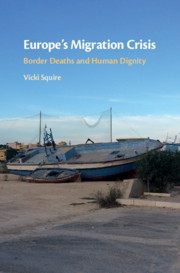Book contents
- Europe’s Migration Crisis
- Europe’s Migration Crisis
- Copyright page
- Contents
- Figures
- Acknowledgements
- Introduction
- Part I The Production of Death and Vulnerability
- Part II The Production of Solidarity and Hope
- Chapter 4 Corridoi Umanitari
- Chapter 5 Sea-Watch
- Chapter 6 Grave Dressing
- Conclusion
- Postscript
- Notes
- Bibliography
- Index
Chapter 4 - Corridoi Umanitari
Dignity in Motion and a Politics of Welcome
from Part II - The Production of Solidarity and Hope
Published online by Cambridge University Press: 16 September 2020
- Europe’s Migration Crisis
- Europe’s Migration Crisis
- Copyright page
- Contents
- Figures
- Acknowledgements
- Introduction
- Part I The Production of Death and Vulnerability
- Part II The Production of Solidarity and Hope
- Chapter 4 Corridoi Umanitari
- Chapter 5 Sea-Watch
- Chapter 6 Grave Dressing
- Conclusion
- Postscript
- Notes
- Bibliography
- Index
Summary
Part I of this book focused on EU policy and explored the ways in which crisis politics intensify longer-standing practices of governing migration through which the deaths and vulnerabilities of people on the move are rendered regular and acceptable. Drawing attention to the various policy mechanisms as well as to dynamics of power and violence that constitute this process of normalising death and vulnerability, it situated contemporary practices of governing migration in the context of a modern European tradition of humanism that is embedded in colonial dynamics and that ultimately fails in its attempt to maintain the security of home. By showing how the so-called Mediterranean migration crisis of 2015–2016 was prompted by a series of border deaths in which biophysical violence and processes of ultra-precaritisation emerged in shocking terms, Part I highlighted the abandonment of people on the move to the environmental forces of the Mediterranean Sea and to situations of harm on arrival to the EU as casualties or survivors. Yet, while the ‘Mediterranean migration crisis’ opened opportunities for consideration of the ongoing colonial legacies and the human conceits embedded within a modern European tradition of humanism and manifest in EU practices of governing migration, the political response was at best limited. Showing how the situation provoked a further toleration of biophysical violence and ultra-precarity on the part of EU governing authorities, Part I argued that EU practices of governing migration rest on the engagement of a form of humanitarian government in which appeals to human dignity reflect longer-standing racialised hierarchies between worthy and unworthy lives. Nevertheless, it also hinted at the importance of moving beyond a critique of humanism, humanitarianism and human dignity, to explore how alternative responses to border deaths challenge a divisive politics grounded in concerns to secure home. Part II thus shifts attention from the mobilisation of dignity by governing authorities to its mobilisation by allies of people on the move, exploring how different pro-migration activist interventions have emerged in terms that produce solidarity and hope for those embroiled in a so-called crisis. Each chapter in Part II examines a specific intervention in its material and discursive dimensions and considers how – and to what extent – the intervention contests the policy mechanisms and dynamics of power and violence through which death and vulnerability are normalised. As such, Part II not only undertakes an analysis of three different interventions in their own right, but also considers their potential – as well as their limitations – in mobilising the concept of dignity towards the creation of alternative horizons of solidarity and hope.
- Type
- Chapter
- Information
- Europe's Migration CrisisBorder Deaths and Human Dignity, pp. 105 - 133Publisher: Cambridge University PressPrint publication year: 2020
- 1
- Cited by

